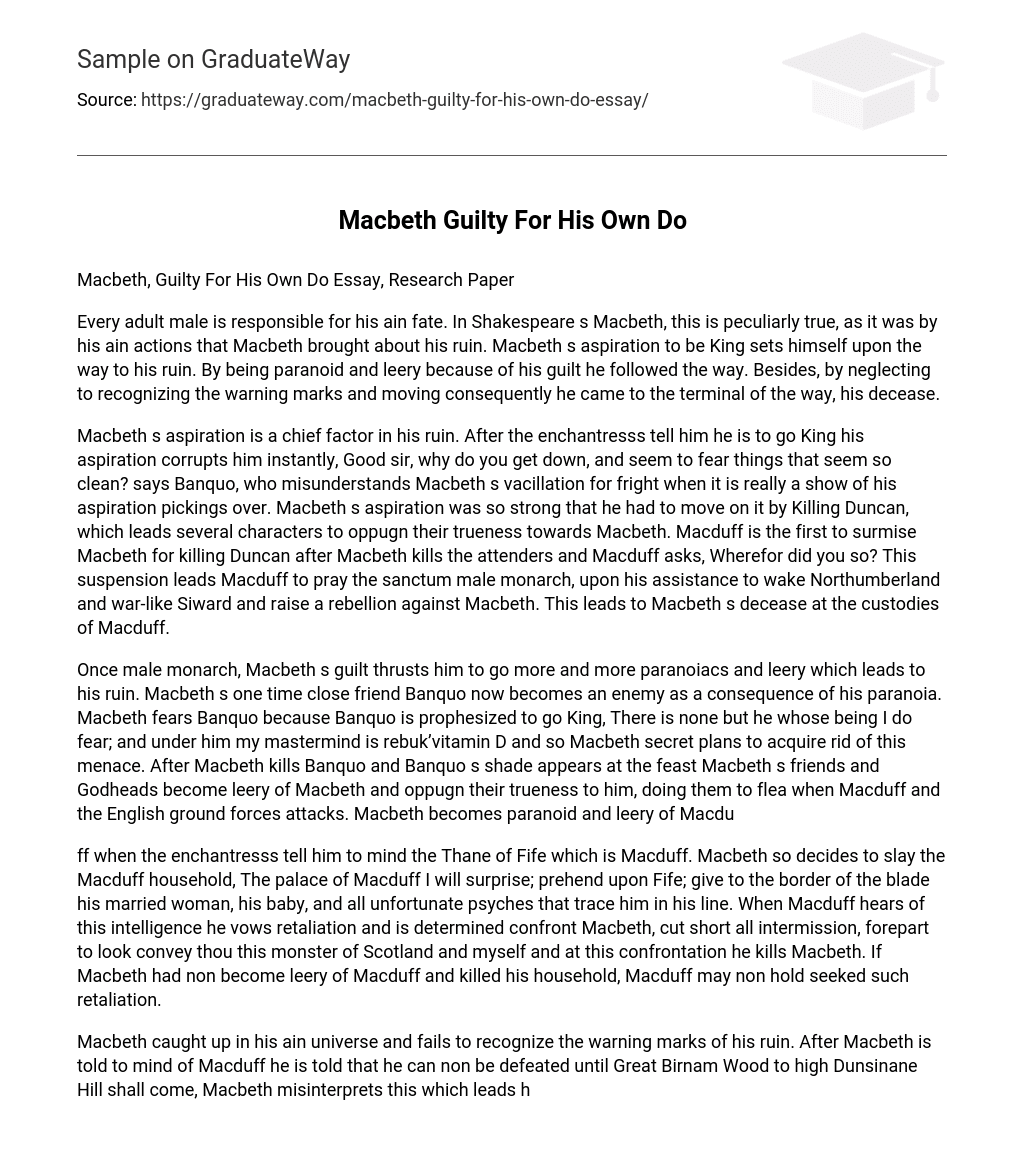Every adult male is responsible for his ain fate. In Shakespeare s Macbeth, this is peculiarly true, as it was by his ain actions that Macbeth brought about his ruin. Macbeth s aspiration to be King sets himself upon the way to his ruin. By being paranoid and leery because of his guilt he followed the way. Besides, by neglecting to recognizing the warning marks and moving consequently he came to the terminal of the way, his decease.
Macbeth s aspiration is a chief factor in his ruin. After the enchantresss tell him he is to go King his aspiration corrupts him instantly, Good sir, why do you get down, and seem to fear things that seem so clean? says Banquo, who misunderstands Macbeth s vacillation for fright when it is really a show of his aspiration pickings over. Macbeth s aspiration was so strong that he had to move on it by Killing Duncan, which leads several characters to oppugn their trueness towards Macbeth. Macduff is the first to surmise Macbeth for killing Duncan after Macbeth kills the attenders and Macduff asks, Wherefor did you so? This suspension leads Macduff to pray the sanctum male monarch, upon his assistance to wake Northumberland and war-like Siward and raise a rebellion against Macbeth. This leads to Macbeth s decease at the custodies of Macduff.
Once male monarch, Macbeth s guilt thrusts him to go more and more paranoiacs and leery which leads to his ruin. Macbeth s one time close friend Banquo now becomes an enemy as a consequence of his paranoia. Macbeth fears Banquo because Banquo is prophesized to go King, There is none but he whose being I do fear; and under him my mastermind is rebuk’vitamin D and so Macbeth secret plans to acquire rid of this menace. After Macbeth kills Banquo and Banquo s shade appears at the feast Macbeth s friends and Godheads become leery of Macbeth and oppugn their trueness to him, doing them to flea when Macduff and the English ground forces attacks. Macbeth becomes paranoid and leery of Macdu
ff when the enchantresss tell him to mind the Thane of Fife which is Macduff. Macbeth so decides to slay the Macduff household, The palace of Macduff I will surprise; prehend upon Fife; give to the border of the blade his married woman, his baby, and all unfortunate psyches that trace him in his line. When Macduff hears of this intelligence he vows retaliation and is determined confront Macbeth, cut short all intermission, forepart to look convey thou this monster of Scotland and myself and at this confrontation he kills Macbeth. If Macbeth had non become leery of Macduff and killed his household, Macduff may non hold seeked such retaliation.
Macbeth caught up in his ain universe and fails to recognize the warning marks of his ruin. After Macbeth is told to mind of Macduff he is told that he can non be defeated until Great Birnam Wood to high Dunsinane Hill shall come, Macbeth misinterprets this which leads him into a false sense of security and so alternatively of fixing for the coming ground forces does nil which allows the prophesy to go true which leads to his licking. When Macbeth learns of the nearing 10,000 military personnels being led by Malcolm and Macduff he says he will contend boulder clay from my castanetss my flesh be hack’d. Give me my armor.” Alternatively of flying like he should hold he stays to contend and prosecute in conflict. Macbeth is non afraid of the 10,000 military personnels because he believes I bear a captivated life, which must non give to one of adult female born but Macduff was from his female parent s uterus prematurely ripp vitamin D and putting to deaths Macbeth. Because he did non recognize the menaces against him he is killed
Macbeth s inability to recognize the menaces against him, his paranoia and suspension of others, and his aspiration that lead others to mistrust him and him to believe irrationally, all lead to his ruin. And so Macbeth is guilty for his ain ruin. Shakespeare leads us to detest Macbeth when he slaughters an guiltless household, and leads us to feel for Macbeth when he realizes his ruin, which he himself is responsible.





